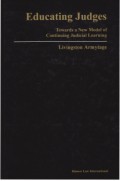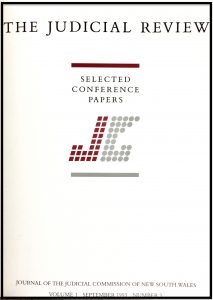Dr. Armytage is the author of leading books on justice reform and judicial education, as well as numerous research monographs and articles in professional journals. He has also published a book of social justice photographs.
» Books
- Unseen Faces, Unheard Voices Portraits of Injustice
- Educating Judges: Towards Improving Justice. A Survey of Global Practice
- Reforming Justice
- Searching for Success in Judicial Reform
- Educating Judges
Click here to view Amazon’s author’s page
» Journals and Other Publications
- Editor – Judicial Education and Training (IOJT)
- Editor – The Judicial Review
- Articles in professional journals
Books
Unseen Faces, Unheard Voices: Portraits of Injustice
Livingston and Miyako Armytage, with the Hon. Justice Michael Kirby
IBC Tokyo 2018
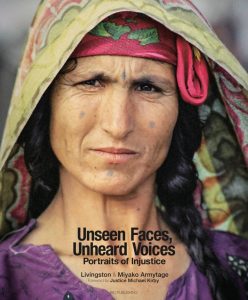 This book presents a collection of photographs of people who are among the poorest of the world’s poor. Many – if not most – lack any official identity. They have little or no access to adequate nutrition, education, health care, employment security or personal safety.
This book presents a collection of photographs of people who are among the poorest of the world’s poor. Many – if not most – lack any official identity. They have little or no access to adequate nutrition, education, health care, employment security or personal safety.
They are survivors of war and genocide; refugees; the dispossessed and homeless; victims of sexual violence and trafficking; slum-dwellers, waste pickers and outcasts. These are pictures of people who routinely suffer injustice.
These photographs pose a question for the viewer: knowing the injustices of this world, what sort of society do we want to live in – and, what can each of us do to build that society? Can we provide a path from poverty to opportunity? Can we improve the lives of others?
Educating Judges: Towards Improving Justice. A Survey of Global Practice
Edited Reprint with Updated Research
Brill 2015
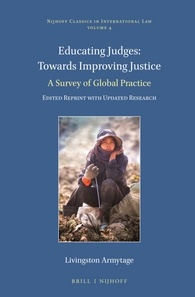
|
This second edition enables judicial educators to develop a more effective pedagogy by focusing on the learning needs, styles and preferences of judges, and by deepening understanding of judges as distinctive learners. It also provides readers with the opportunity to gauge what has happened – or not – in the world of judicial education over the past two decades, including:
In doing so, this edition refocuses attention on the vision and purpose of judicial education. The author presents two arguments: first that the vision of judicial education is to help judges to deliver substantive justice outcomes that measurably improve wellbeing; and second that judicial educators are leaders responsible to realise this vision. |
Reforming Justice*
A Journey to Fairness in Asia
Cambridge University Press 2012

Justice is fundamental to human well being and development. Since Aristotle, justice has been recognised as core to any civilised notion of the good life, government and society: government without justice is tyranny, and society without justice is anathema to its citizens. Civic well being is unattainable without justice. Nonetheless, justice is routinely subverted in many countries. Citizens, usually the powerless poor, are denied justice through impunity, corruption, abuse of power and the denial of rights. These are the usual challenges of reforming justice. Over the past fifty years, development agencies have spent billions of dollars grappling with the challenge of improving “the rule of law” through improving economic growth and good governance. But the results have been often dismal. The unmet challenge is to address mounting concerns about equity and distribution. In his new book, Dr. Armytage calls for justice to be positioned more centrally in evolving notions of equitable development. Building on new evidence from Asia, he argues that it is time to realign these reforms to promote justice as fairness and equity.
*Also available in paperback and ebook.
Searching for Success in Judicial Reform
Voices from the Asia Pacific Experience
Armytage L. and Metzner L. (Editors)
Oxford University Press 2009
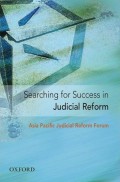
|
This unique and timely volume presents the collective reform experience of some of the Asia Pacific region’s most skilled judges, court administrators, legal scholars and researchers.
The publication comprises provoking analyses of recent judicial reform programmes undertaken by a cross-section of Forum countries, with contributions from: Deputy Chief Justice Prof Dr Paulus Lotulung, Indonesia; Justice Dr Ananda Bhattarai, Nepal; Justice Kim Sathavy, Cambodia; Prof Dr Mohan Gopal, India; Prof Myrna Feliciano, Philippines; Ms Ayesha Dias, India and Sri Lanka; Ms Zenaida Elepano, Philippines; Ms Anita Jowitt, Vanuatu; Mr Ly Tayseng, Cambodia; Mr Aria Suyudi, Indonesia; and Mr Hari Phuyal, Nepal. These papers provide a wealth of insights relevant across the region that address many of the modern challenges of justice: exclusion, delay, corruption and incompetence. Analysis of this experience indicates the existence of ten themes, or overarching challenges, which have confronted the passage of judicial reform over recent years. These relate to goals, leadership, independence, capacity for change, training, integration, community, donors, data and results. Any serious contemplation of judicial reform should acknowledge the challenges of practice evidenced in the experience of authors in this collection. |
Educating Judges
Introduced by Sir Anthony Mason, Chief Justice of Australia 1987-1995
Kluwer Law International (London, Boston, The Hague), 1996
Judicial education is new to the common law tradition of judging. During the past twenty years, the education of judges has become a matter of considerable prominence and debate in the United States, Britain, Canada and Australia, most recently prompted by media complaints of gender and racial bias. This work researches the underlying issues through a comparative analysis of experience across the common law world. The author explores the need for judicial education and how it should be provided. He argues that judicial education is a distinctive process, owing to the imperative for judicial independence and a number of educational considerations. The work offers a model approach for educating judges and provides analysis, reasoned insights and practical assistance for judges and educators to guide future endeavour.
This seminal monograph provides a comprehensive study of judicial education, and forms a part of major collections around the world, including the Bodleian Library University of Oxford, Harvard Law School and the University of Sydney.
Journals and Other Publications
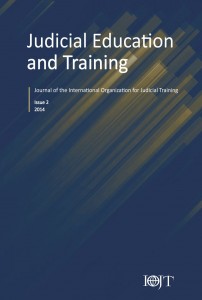 |
Dr. Armytage was editor of ‘Judicial Education & Training’, the journal of the International Organisation for Judicial Training (IOJT).
|
|
|
He was also founding editor of the ‘The Judicial Review’, between 1991-1996. |
Judicial Development Toolkits
Pacific Judicial Development Program: PJDP
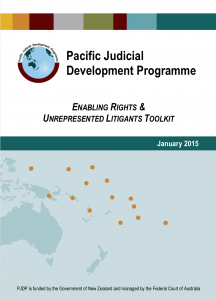 |
Enabling Rights Toolkit |
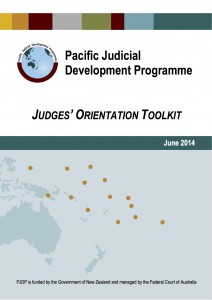 |
Judges’ Orientation Toolkit
|
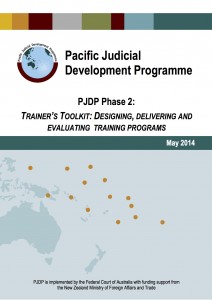 |
Trainers’ Orientation Toolkit |
Issues Paper
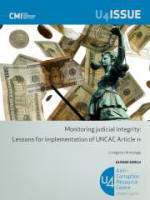 |
U4 Anti-Corruption Resource Centre (EU, Norway)
Monitoring Judicial Integrity:
|
Articles in Peer-Reviewed Professional Journals
University of Sydney Library holdings
Educating Judges – Where to from here?
Journal of Dispute Resolution, 2015, 167-173
Poverty, Justice and the Rule of Law
International Bar Association, London 2013
Imperative to Realign the Rule of Law to Promote Justice
Nepal Judicial Academy Law Journal, 2012
Evaluating Aid: an adolescent discipline
Evaluation, 2011 vol. 17(3): 261-276
Judicial reform in Asia: case study of ADB’s experience: 1990-2007
Hague Journal on the Rule of Law, 2011 vol. 3: 70-105
Judicial reform in Asia: case study of AusAID’s experience in Papua New Guinea: 2003-2007
Journal of Development Effectiveness, Vol. 2, No. 4, December 2010, 442-467
This case study evaluates the experience of Australia’s aid agency (AusAID) in supporting bilateral judicial reform in Papua New Guinea through its Law and Justice Sector Program between 2003 and 2007.
Legal and judicial reform performance monitoring: the PNG approach
The European Journal of Development Research, Vol. 20, No. 1, March 2008, 141-157, co-authored with Steve Miller
Justice in Afghanistan – Rebuilding Judicial Competence after the Generation of War
Heidelberg Journal of International Law, HJIL/ZaöRV 67,2007, 185-210
Monitoring Performance of Legal and Judicial Reform in International Development Assistance – Early Lessons from Port Moresby & Phnom Penh
International Bar association Chicago Showcase, Judicial Reform: Economic Development and the Rule of Law, 18 September 2006
Training of Judges: Reflections on Principle and International Practice
European Journal of Legal Education, 2005 2(1) EJLE 21-38
Pakistan’s Law & Justice Sector Reform Experience – Some Lessons
Law, Social Justice and Global Development Journal, University of Warwick (LGD) 2003 (2)
Pakistan’s Judicial Reform Program
Australian Law Journal, May 2001
Judicial Education as an Agent of Leadership and Change: Lessons from Common and Civil Law Experience
The Judicial Journal of the Supreme Court of the Philippines (PHILJA) Vol. 5, Issue No. 15, January 2003
Performance Indicators – Evaluating Judicial Education
International Bar Association Newsletter, May 1998; IBA Judges’ Forum Newsletter 6,1, September 1998; and, National Association of State Judicial Educators News 13, Spring 1998
Judging: an Occupation and Skills Analysis – Implications for Educators
National Association of State Judicial Educators News 11, 3, Fall 1996
Judicial Education on Equality – with particular reference to gender and ethnicity
The Modern Law Review, 1995, 58, 160-186
A Review of Aspects of the Specialist Accreditation Program of the Law Society of New South Wales
Centre for Legal Education Sydney, Australia 1995-1996
Evaluating the Impact of Judicial Education
Journal of Judicial Administration, 1995, 4, 1, 143-170
Training for New Judges
Judicial Officers’ Bulletin, 1995, 6, 10, 73-79
Judicial Orientation: 6 Factors Influencing Educational Program Development
International Bar Association, Melbourne, October 1994
Need for Continuing Judicial Education
University of New South Wales Law Journal, 1993, 16, 536-584
Policy Development in Continuing Judicial Education: An Assessment of Some Approaches Taken in New South Wales, United States, United Kingdom and Canada
Journal of Professional Legal Education, 1993, 11, 1, 51-78
Continuing Judicial Education: The Education Program of the Judicial Commission of New South Wales
Journal of Judicial Administration, 1993, 3, 1, 28-46
Founding Editor, The Judicial Review
Judicial Commission of New South Wales, Sydney, 1992-5
New South Wales, Australia Mentoring Profile
Catlin DW, Mentoring in the Judiciary, Lansing, Michigan: JERITT Monograph 2, 1992, 52-59
Towards Professionalism in Continuing Legal Education – Some Questions of Policy and Practice
Journal of Professional Legal Education, 1990, 8, 139-148
